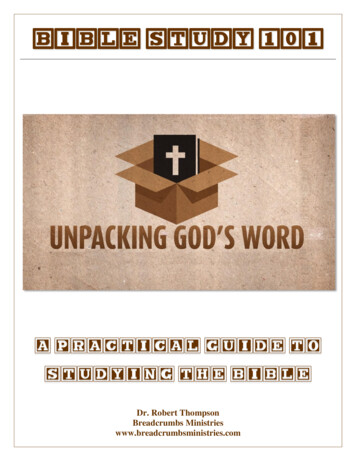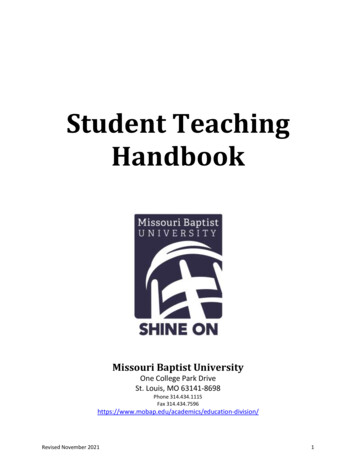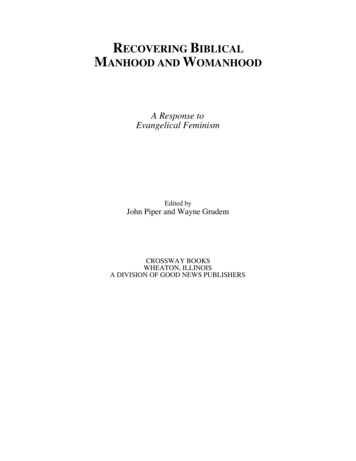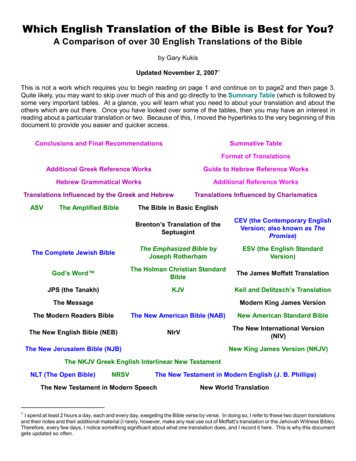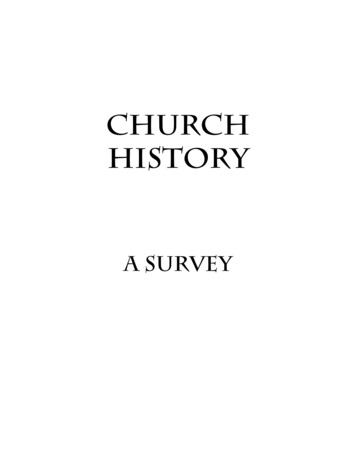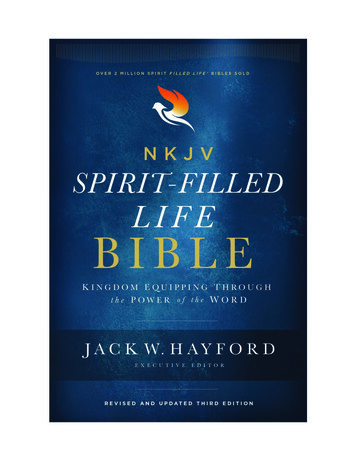
Transcription
NKJVSPI R I T-FILLEDLIFE BIBLETHIRD EDITIONEXECUTIVE EDITORJack W. Hayford, Litt.D.A S S O C I AT E E D I TO R SPaul G. Chappell, Ph.D.Steven Fry, M.Th.Kenneth C. Ulmer, Ph.D., D.Min.O L D T E S TA M E N T E D I T O RRoy Hayden, Ph.D.N E W T E S TA M E N T E D I T O R SJon Huntzinger, Ph.D.Gary Matsdorf, M.A.9780529100146 00 frontmatter nkjv nsfl 3rds.indd 32/19/18 10:25 AM
Spirit-Filled Life Mission StatementThe mission of Spirit-Filled Life Bibles and reference products is to serve the body of Christ with abroad range of trustworthy products marked by biblical soundness, balanced scholarship, and asense of honor toward the modern-day working of the Holy Spirit. These resources are designedto provide biblical equipping for practical living in God’s kingdom and around the world.The Spirit-Filled Life Bible, Third EditionCopyright 2018 by Thomas Nelson.Published in Nashville, Tennessee, by Thomas Nelson.Thomas Nelson is a registered trademark of HarperCollins Christian Publishing, Inc.The Holy Bible, New King James Version, copyright 1982 by Thomas Nelson. All rights reserved.Concordance copyright 1995 by Thomas Nelson.Project management by Thinkspot Communications, Franklin, TNLibrary of Congress Control Number: 2018932874The text of the New King James Version (NKJV) may be quoted or reprinted without prior permission with the following qualifications:(1) up to and including 1,000 verses may be quoted in printed form as long as the verses quotedamount to less than 50% of a complete book of the Bible and make up less than 50% ofthe total work in which they are quoted;(2) all NKJV quotations must conform accurately to the NKJV text.Any use of the NKJV text must include a proper acknowledgment as follows:Scripture taken from the New King James Version. Copyright 1982 by Thomas Nelson. Usedby permission. All rights reserved.However, when quotations from the NKJV text are used in church bulletins, orders of service,Sunday School lessons, church newsletters, and similar works in the course of religious instructionor services at a place of worship or other religious assembly, the following notice may be used atthe end of each quotation: NKJV.For quotation rights not covered by the above guidelines, write to Thomas Nelson, Attn: BibleRights and Permissions, P.O. Box 141000, Nashville, TN 37214-1000.Printed in China1 2 3 4 5 6 7 8 9 10—24 23 22 21 20 19 189780529100146 00 frontmatter nkjv nsfl 3rds.indd 42/19/18 10:25 AM
viiiCONTRIBUTORSJack W. Hayford, Litt.D.Executive EditorPaul G. Chappell, Ph.D.Associate EditorRoy Hayden, Ph.D.Old Testament EditorSteven Fry, M.Th.Associate EditorJon Huntzinger, Ph.D.Gary Matsdorf, M.A.New Testament EditorsKenneth C. Ulmer, Ph.D., D.Min.Associate EditorN E W K I N G D OM DY N A M I C S A N D A RT I C L E CON T R I B U TO R SF O R T H E S P I R I T- F I L L E D L I F E B I B L E , T H I R D E D I T I O NMike BickleJimmy EvansInternational House of Prayer of Kansas CityKansas City, MissouriGrowing in PrayerFounder and CEO, MarriageTodayDallas, TexasThe Spirit-Filled FamilySarah BowlingJane Hansen Hoyt, D.D.International Bible TeacherFounder, Saving MosesDenver, ColoradoLiving in the Power and Promise of God’s WordPresident and CEO, Aglow InternationalEdmonds, WashingtonThe Key of Suffering: Unlocking God’s GloryBeth ClarkMarilyn Hickey, B.A., D.D.Thinkspot CommunicationsFranklin, TennesseePraying the WordInternational Bible TeacherMarilyn Hickey MinistiresDenver, ColoradoLiving in the Power and Promise of God’s WordTim ClarkJon Huntzinger, Ph.D.Senior Pastor, The Church On The WayVan Nuys, CaliforniaBiblical MenDistinguished Professor of Bible and MinistryThe King's SeminarySouthlake, TexasNew Testament Word WealthGermaine Griffin CopelandAuthor, Bible TeacherGreensboro, GeorgiaGrowing in PrayerRoger D. Cotton, Th.D.Ron Kenoly, Ph.D.Founder and President, Ron Kenoly Ministries Inc.Orlando, Florida, USAThe Power of Praise and WorshipProfessor of Old TestamentThe Assemblies of God Theological SeminaryEvangel UniversitySpringfield, MissouriOld Testament Word WealthA. Boyd Luter, Ph.D.Bradley J. Embry, Ph.D.Robert Morris, D.Litt.Associate Professor of Old TestamentRegent UniversityVirginia Beach, VirginiaOld Testament Word WealthFounding Senior Pastor, Gateway ChurchDallas/Fort Worth, TexasFaith for a Blessed LifeHow to Lead Someone to Jesus9780529100146 00 frontmatter nkjv nsfl 3rds.indd 8Faculty in Biblical StudiesThe King’s UniversitySouthlake, TexasNew Testament Word Wealth2/19/18 10:25 AM
ixCONTRIBUTORSMary Jo PierceRobert StearnsPastor of Prayer and IntercessionGateway ChurchSouthlake, TexasPraying the WordFounder, Eagles’ WingsClarence, NYThe Power of Praise and WorshipWorship and Intercession: The Calling of AllBelieversSamuel Rodriguez, M.Ed.Lead Pastor, New SeasonSacramento, CaliforniaHuman Worth and Divine DestinyTraits of Spiritual LeadershipMarcos WittRecording Artist, Worship Leader, Author, PastorFounder, CanZion GroupHouston, TXThe Power of Praise and WorshipK I N G D O M D Y N A M I C S , W O R D W E A LT H , A N DTRUTH IN ACTION CONTRIBUTORS FROM THEO R I G I N A L S P I R I T- F I L L E D L I F E B I B L E A N DT H E N E W S P I R I T- F I L L E D L I F E B I B L EBarbara Amos, B.A., M.Div.Dick Eastman, B.A., D.D.Biblical WomenWinning the Spiritual WarRebecca Hayford Bauer, M.A.Gerald L. FryThe Spirit-Filled FamilyScott G. Bauer,* B.A., M.Div., D.Min.Holy Spirit FullnessCharles Blake, B.A., M.Div., D.Th.Human Worth and Divine DestinyReinhard Bonnke, D.D.Moving Into and Through RevivalSteven Fry, M.Th.Growing in Knowing GodJoseph Garlington, Sr., Ph.D.Traits of Spiritual LeadershipAflame with Passion for World EvangelismCharles Green, B.A., D.Th., Litt.D., D.H.L.Jamie Buckingham,* A.B., B.D., M.R.E.,D.H.L.Jane Hansen Hoyt, D.D.The Power of Praise and WorshipTraits of Spiritual LeadershipMen and Women in God’s DesignPaul A. Cedar, B.S., M.Div., D.Min., D.D.Jack W. Hayford, B.A., B.Th., D.D., Litt. D.The Power of Unity Among BelieversThe Kingdom of God; The Word of God; Prophecyand the Scriptures; Godliness and Moral PurityDennis Corrigan, B.A., B.Div., M.Div.Truth in Action(Matthew—Romans, Galatians, 1 and 2 Timothy,Philemon, Jude, Revelation)Beverly “Bam” Crawford, D.D.The Ministry of AngelsBilly Joe Daugherty,* B.A., M.A., D.Min.Christopher J. HaywardMinistering Deliverance from BondageMarilyn Hickey, B.A., D.D.The Ministry of AngelsFreda Lindsay, B.A., D.D., D.H.L.Shepherding Amid the SupernaturalBiblical WomenJohn D. DawsonBill McCartney, B.S.The Believer's Potential and Pathway forMinistering Healing to the NationsThe Reconciling MinistryA. Joy DawsonDick Mills,* B.A., D.D.(assisted by David Michael)IntercessionWord Wealth9780529100146 00 frontmatter nkjv nsfl 3rds.indd 92/19/18 10:25 AM
CONTRIBUTORSxLeslyn Musch, MATShira Sorko-Ram, B.A.Truth in ActionUnderstanding Messianic Jewish MinistryLloyd John Ogilvie, B.A., M.Th., D.D.,D.H.L.Kenneth C. Ulmer, B.A., M.A., Ph.D.,D.Min.The Call to Unity in Christ’s BodyG. E. Patterson*Growth in Life EnrichmentLifestyle StewardshipNathaniel M. Van Cleave,* B.A., Th.D.,D.D.Keith W. Phillips, B.A., M.Div., D.Min.The Ministry of Divine HealingServing 21st Century Human NeedFuchsia T. Pickett,* D.Th., D.D.Christlikeness of CharacterFrederick K. C. Price, D.D.God’s Plan for AbundanceJames W. RyleProphetic Dreams and Visions in the ScripturesPaul Walker, B.A., M.Div., M.Ed., Ph.D.Holy Spirit Gifts and PowerRaleigh B. Washington, M.Div., D.D.,D.Min.The Reconciling MinistryClark Whitten, B.S., M.Div.Divine Principles of Money ManagementCharles Simpson, B.A.The Blood of the Covenant*deceasedBOOK INTRODUCTIONS, OUTLINES, AND NOTESArden Conrad Autry, B.A., M.A., Ph.D.John Garlock,* B.A., M.A.James Lee Beall, B.A., M.Th., Th.D.Trevor L. Grizzle, B.A., M.Div., Ph.D.2 Corinthians1 and 2 Timothy, TitusR. Russell Bixler, B.A., M.A., M.Div.GenesisCharles E. Blair, Th.B., D.D., Litt.D.JobPaul G. Chappell, B.A., M.Div., Th.M.,M.Phil., Ph.D.DeuteronomyJerry Cook, B.A., B.D.1 and 2 Samuel, JoelA. Joy DawsonProverbsColossiansWayne A. Grudem, B.A., M.Div., Ph.D.RomansRoy Edmund Hayden, A.A., B.A., B.Th.,B.D., Th.M., M.A., Ph.D.Jeremiah, Ezekiel (coauthored with Howard M.Ervin), AmosJack W. Hayford, B.A., B.Th., D.D., Litt.D.Ruth, EphesiansCheryl Lynn Hetherington, S.T.D., M.A.,M.Phil., Ph.D.EstherJudgesGuy P. Duffield, S.T.D., D.D.HebrewsCharles L. Holman, B.A., B.D., Th.M.,Ph.D.Willard S. Elijahson, B.A., M.A., B.D.,S.T.M., Th.D.Jerry Horner, B.A., M.Div., Th.D.MicahGalatians, Philippians, 3 JohnHoward M. Ervin,* A.B., Th.B., B.D.,M.A., Th.D.Richard Duane Israel, B.A., M.Div.,M.A., Ph.D.Ezekiel (coauthored with Roy E. Hayden)Numbers9780529100146 00 frontmatter nkjv nsfl 3rds.indd 101 and 2 Peter, Jude2/19/18 10:25 AM
xiK. R. “Dick” Iverson, D.Th.PsalmsGary Kinnaman, B.A., M.A.ActsJohn Louwerse, B.S., B.C.A., M.A. Ling.,M.A. Miss., M.Div., Ph.D.MalachiDavid Charles Mainse,* S.T.M.CONTRIBUTORSJon Mark Ruthven, B.A., M.A., B.D.,Ph.D.JamesSiegfried Schatzmann, B.A., M.Div.,Ph.D.JohnDavid Warren Shibley, B.A., M.Div.ZechariahNehemiahGary Matsdorf, B.A., M.A.EzraRonald Mehl,* B.Th., D.D.JoshuaSam Middlebrook,* B.Th., B.A., M.Div.,D.Min.Bob G. Slosser,* B.A., L.H.D.PhilemonCharles W. Snow, Jr., B.S., M.A., Ed.D.JonahRussell P. Spittler, B.A., M.A., B.D., Ph.D.1 and 2 ThessaloniansHosea, Habakkuk, HaggaiJ. Lyle Story, B.A., M.Div., Ph.D.Earl Wesley Morey, B.A., M.Div., Ph.D.Matthew, Mark, LukeRevelationColeman Cox Phillips,* B.Th., B.A.,M.Ed., D.D.Daniel, additional notes for RevelationMary LaVonne Phillips, B.R.E., B.S.,M.A.James Carroll Tollett, B.A., M.Div.,D.Min.ExodusNathaniel M. Van Cleave,* B.A., Th.D.,D.D.ZephaniahIsaiahDonald Pickerill, B.Th., B.A., M.A.Paul B. Watney, B.A., M.A., D.Miss.,Ph.D.Song of Solomon, 1 CorinthiansTimothy Mark Powell, B.S., M.Div.,Ph.D.Obadiah, NahumLarry D. Powers, A.A., B.A., M.A.1 and 2 Kings, 1 and 2 ChroniclesPeter E. Prosser, B.A., B.Th., M.A., Ph.D.1 and 2 John9780529100146 00 frontmatter nkjv nsfl 3rds.indd 11LamentationsWilliam C. Williams, B.A., M.A., Ph.D.EcclesiastesBrad H. Young, B.A., M.A., Ph.D.Leviticus*deceased2/19/18 10:25 AM
T H E B O O K OFJEREMIAHAUTHOR: JeremiahDATE: 626–586 b.c.THEMES: Failure to Repent Leads to Destruction; God Will RestoreKEY WORDS: Word of the Lord, Heart, ReturnAUTHORJeremiah, son of Hilkiah, was a prophet from the town of Anathoth and perhapswas descended from the priest Abiathar. The meaning of his name is uncertain,but “Yahweh Exalts” and “Yahweh Throws” are possibilities. More is known aboutJeremiah’s personal life than any other prophet in the Old Testament becausehe gives us so many glimpses into his thinking, concerns, and frustrations.God commands Jeremiah not to marry or have children to illustrate thatjudgment is pending and that the next generation would be swept away (16:1–13).Jeremiah’s closest friend and associate is his scribe Baruch. Other than thisman, he has few friends. Only Ahikam, Ahikam’s son Gedaliah, and Ebed-Melechseem to qualify. Partly, this is because Jeremiah proclaims a message of doom, amessage contrary to the hope of the people and one that includes a suggestionof surrender to the Babylonians. In spite of Jeremiah’s declaration of disaster,his scathing rebuke of the leaders, and contempt for idolatry, his heart achesfor his people because he knows that Israel’s salvation cannot be divorcedfrom faith in God and a right covenantal relationship expressed by obedience.DATEJeremiah prophesied to Judah during the reigns of Josiah, Jehoahaz, Jehoiakim,Jehoiachin, and Zedekiah. His call is dated at about 627 b.c., and his ministrycontinued until a short time after the fall of Jerusalem in 586 b.c. The prophetZephaniah preceded Jeremiah slightly; and Nahum, Habakkuk, and perhapsObadiah were contemporaries. Ezekiel was a younger contemporary who prophesied in Babylon from 593 to 571 b.c.BACKGROUNDJeremiah began his ministry in the reign of Josiah, a good king who temporarilydelayed the judgment God had declared due to Manasseh’s wicked rule. Josiah had begun a reform, which included the destruction of pagan high placesthroughout Judah and Samaria. The reform, however, had little lasting effecton the people.Events were changing rapidly in the Near East. Assyria was weakening, andAshurbanipal, the last great Assyrian king, died in 627 b.c. Josiah was expandinghis territory to the north; King Nabopolassar from Babylon and Pharaoh Nechofrom Egypt were trying to assert their authority over Judah.In 609 b.c., Josiah was killed at Megiddo when he attempted to prevent Nechofrom aiding the Assyrian remnant. Josiah’s three sons (Jehoahaz, Jehoiakim,9780529100146 04 isa mal nkjv nsfl 3rds.indd 9912/12/18 12:47 PM
INTRODUCTION TO JEREMIAH992and Zedekiah) and a grandson (Jehoiachin) followed him on the throne. Jeremiah saw the folly of the political policy of these kings and warned them ofGod’s plan for Judah, but they did not heed the warning. Jehoiakim was openlyhostile to Jeremiah and destroyed one scroll Jeremiah had sent by cutting offa few columns at a time and throwing them into the fire. Zedekiah was a weakand vacillating ruler, at times seeking Jeremiah’s advice, but at other timesallowing Jeremiah’s enemies to mistreat and imprison him.CONTENTThe book consists mainly of a short introduction (1:1–3), a collection of oracles against Judah and Jerusalem that Jeremiah dictates to his scribe Baruch(1:4—20:18), oracles against foreign nations (25:15–38; chs. 46–51), events written about Jeremiah in the third person, perhaps by Baruch (chs. 26–45), anda historical appendix (ch. 52) that is almost identical to 2 Kings 24 and 25. Theprophecies in the book are not in chronological order.Jeremiah has a compassionate heart for his people and prays for them evenwhen the Lord tells him not to do so. Yet he condemns the rulers, the priests,and false prophets for leading the people astray. He also attacks the peoplefor their idolatry and proclaims severe judgment unless they repent. BecauseJeremiah knows God’s intentions, he advocates surrender to the Babyloniansand writes to those already in exile to settle down and live normal lives. Whilemany people brand Jeremiah as a traitor for preaching surrender, he has theirbest interest at heart. Jeremiah knows that God cares about individuals andtheir relationship to Him; he also knows that unless the people honor God’scovenant, the nation will be destroyed.Jeremiah was just a youth when God called him to carry a severe messageof doom to his people. He attempted to avoid this task but could not remainsilent. The people had become so corrupt under Manasseh that God had nochoice but to bring an end to the nation. Defeated and taken into exile, thepeople would reflect on what had happened to them and why. Then, after Godchastised them and they repented, God would bring a remnant back to Judah,punish the nations who had punished them, and fulfill His old covenants withIsrael, David, and the Levites. In addition, He would give them a New Covenantand write His law on their hearts. David’s throne would again be established,and faithful priests would serve them.LITERARY FEATURESJeremiah uses many literary styles and devices, and while he writes some chapters in prose, most chapters are poetic in form. His poetry is as beautiful andlyrical as any in Scripture. He effectively makes use of repetition, such as thephrase “by the sword, by the famine, and by the pestilence” (14:12). Jeremiahuses symbolism in his portrayal of the linen sash (13:1), the potter’s earthen flask(19:1), and the bonds and yokes (27:2). Cryptograms are used in 25:26 and 51:1,41. Jeremiah is a keen observer of plants and animals (2:21, 23), and has givenus many beautiful phrases (2:13; 7:11; 8:20, 22; 31:29, 33).PERSONAL APPLICATIONJeremiah sees that religion is essentially a moral and spiritual relationship withGod, a relationship that elicits our devotion; he also sees that we are responsible for our own sin. The New Covenant (31:31–40) is the spiritual bond that9780529100146 04 isa mal nkjv nsfl 3rds.indd 9922/12/18 12:47 PM
993INTRODUCTION TO JEREMIAHGod forms with us. It is a new and unconditional covenant where God writesthe law on our hearts, forgives our iniquity, and remembers our sins no more.All this is fulfilled in the incarnation of Christ and in the gospel He preaches.Much of Jeremiah’s message is relevant because it is timeless. Sin always mustbe punished, but true repentance brings restoration. Idolatry, which consistsof such things as wealth, talent, or position, is called by new names today, butthe sin is the same, and the remedy is the same. God calls for obedience to Hiscommands in a pure covenantal relationship. Sin requires repentance andrestoration; obedience leads to blessing and joy.CHRIST REVEALEDThrough his action and attitude Jeremiah portrays a lifestyle similar to that ofJesus, and for this reason he may be called a type of Christ in the Old Testament.Jeremiah shows great compassion for his people and weeps over them. Hesuffers much at their hands, but he forgives them. It can be said that Jeremiahis one of the most Christlike personalities in the Old Testament.Jesus alludes to several passages from Jeremiah in His teaching: “Has thishouse, which is called by My name, become a den of thieves in your eyes?” (7:11;Matt. 21:13); “Who have eyes and see not, and who have ears and hear not” (Jer.5:21; Mark 8:18); “Then you will find rest for your souls” (Jer. 6:16; Matt. 11:29);“My people have been lost sheep” (Jer. 50:6; Matt. 10:6).THE HOLY SPIRIT AT WORKA symbol of the Holy Spirit is fire. God assures Jeremiah, “I will make My wordsin your mouth fire” (5:14). At one point Jeremiah wants to stop mentioning God,but he says, “His word was in my heart like a burning fire shut up in my bones;I was weary of holding it back, and I could not” (20:9). Today we would call thisthe work of the Holy Spirit in Jeremiah.Apart from inspiring the prophet and revealing God’s message to him, theHoly Spirit is the One to carry out the promise of a New Covenant that will putGod’s law in our minds and write it on our hearts. The external commands of theOld Covenant will now be internalized, and we will have the power to conformin every respect to God’s moral law. The knowledge of God will be universal,and other peoples will be included in God’s blessing. Under the Old Covenant,forgiveness was promised, but now forgiveness comes with the promise thatGod will remember our sin no more.9780529100146 04 isa mal nkjv nsfl 3rds.indd 9932/12/18 12:47 PM
INTRODUCTION TO JEREMIAH994OUTLI NE OF JEREMIAHI. Jeremiah’s Call1:1–19II. Discourses2:1—33:26A. Earliest oracles2:1—6:30B. Temple sermon and cultic7:1—8:3abusesC. Miscellaneous materials8:4—10:25D. Events in Jeremiah’s life 11:1—13:27E. Drought and other14:1—15:21catastrophesF. Warnings and promises 16:1—17:18G. Keep the Sabbath day holy 17:19–27H. Lessons from the potter 18:1—20:18I. Oracles against kings, prophets,and people21:1—24:10J. The Babylonian exile25:1—29:32K. The book of consolation 30:1—33:2634:1—35:19III. Historical AppendixA. Warning to Zedekiah34:1–7B. Manumission of slaves34:8–22revokedC. The symbol of the Rechabites 35:1–19IV. Jeremiah’s Trials andSufferings36:1—45:5A. Jehoiakim and the scrolls36:1–329780529100146 04 isa mal nkjv nsfl 3rds.indd 994B. Siege and fall of Jerusalem 37:1—40:6C. Gedaliah and hisassassination40:7—41:18D. The flight to Egypt42:1—43:7E. Jeremiah in Egypt43:8—44:30F. Oracle to Baruch45:1–5V. Oracles Against ForeignNations46:1—51:64A. Against Egypt46:1–28B. Against the Philistines47:1–7C. Against Moab48:1–47D. Against the Ammonites49:1–6E. Against Edom49:7–22F. Against Damascus49:23–27G. Against Kedar and Hazor49:28–33H. Against Elam49:34–39I. Against Babylon50:1—51:64VI. Historical Appendix52:1–34A. Zedekiah’s reign52:1–3B. Siege and fall of Jerusalem52:4–27C. Summary of threedeportations52:28–30D. Release of Jehoiachin fromprison52:31–342/12/18 12:47 PM
9951 The words of Jeremiah the son ofHilkiah, of the priests who were a inAnathoth in the land of Benjamin, 2towhom the word of the LORD came in thedays of aJosiah the son of Amon, king ofJudah, bin the thirteenth year of his reign.3It came also in the days of a Jehoiakimthe son of Josiah, king of Judah, b untilthe end of the eleventh year of Zedekiahthe son of Josiah, king of Judah, cuntil thecarrying away of Jerusalem captive din thefifth month.The Prophet Is Called5CHAPTER 11 aJosh. 21:18;1 Kin. 2:26;1 Chr. 6:60;Is. 10:30; Jer.29:272 a1 Kin. 13:2;2 Kin. 21:24;2 Chr. 34:1;Jer. 3:6; 36:2bJer. 25:33 a2 Kin. 23:34;1 Chr. 3:15;2 Chr. 36:5–8;Jer. 25:1 b2 Kin.24:17; 1 Chr.3:15; 2 Chr.36:11–13;Jer. 39:2 cJer.52:12 d2 Kin.25:84Then the word of the LORD came to me,saying:K I N G D OMDYNAMICS1:4, 5 A Believer’s Prophetic Assignment(Jeremiah), BIBLICAL MEN. Born into apriestly line, Jeremiah was set apart beforebirth, and called and empowered as a youngman to tear down and build up as a prophet to the nations (1:1–10). His assignmentincluded proclaiming the truth of God’simpending judgment on sin (11:9–13), andproviding hope through turning back to God(7:2–7; 29:11–14; 31:27–34). However, far fromdelighting in his warnings of doom, Jeremiahexpressed deep concern for his neighbors(8:21; 9:1).God has a plan for each of His people tooperate with similar kingdom principles:Every believer is born-again into a priestlyrole (1 Pet. 2:5–9), but is also set apart andempowered to declare truth to those whoare far from God (Acts 1:8; 2 Cor. 5:18–20). Thisprophetic message will be used to tear downstrongholds and arguments against God’sways (2 Cor. 10:4, 5), and to build up othersto discover their intended redemptive purpose (Eph. 2:10; Jer. 29:11). But, like Jeremiah,God’s people are not called to rejoice overimpending judgment (Prov. 24:17; James 2:12,13), but must embrace compassionate lovefor those who need to hear God’s graciousoffer of salvation from destruction (Rom. 5:8;1 Tim. 2:4). (Job 1:8/Dan. 6:3) T.C.“Before I aformed you in the womb bIknew you;Before you were born I csanctified1 you;I 2ordained you a prophet to thenations.”56Then said I:a“Ah, Lord GOD!Behold, I cannot speak, for I am ayouth.”7But the LORD said to me:“Do not say, ‘I am a youth,’For you shall go to all to whom I sendyou,And awhatever I command you, youshall speak.8 a Do not be afraid of their faces,For bI am with you to deliver you,” saysthe LORD.9Then the LORD put forth His hand anda touchedmy mouth, and the LORD saidto me:5 aIs. 49:1, 5bEx. 33:12c[Luke 1:15];Gal. 1:15 1setyou apart2appointed6 aEx. 4:10;6:12, 307 aNum. 22:20,38; Jer. 1:17;Matt. 28:208 aEzek. 2:6;3:9 bEx. 3:12;Deut. 31:6;Josh. 1:5; Jer.15:20; Heb.13:69 aIs. 6:7; Mark7:33–35 bEx.4:11–16; Deut.18:18; Is.51:16*See WW atDeut. 1:1.10 a1 Kin. 19:17bJer. 18:7–10;Ezek. 22:18;[2 Cor. 10:4, 5]1:1 Son of Hilkiah: Used to distinguish this Jeremiah fromseveral other men of the same name, two of whom were hiscontemporaries (35:3; 52:1). Priests: Like Ezekiel, who was hisyounger contemporary, Jeremiah was both a prophet and priest.Anathoth: A city located about 3 miles northeast of Jerusalem inthe territory of Benjamin and the birthplace of Jeremiah. Godinstructed him to redeem a field in that city (32:7–9).1:2 Word of the LORD: A favorite expression of Jeremiah, usedmore than 50 times. Josiah was the last good king of Judah, andJeremiah’s ministry began in Josiah’s thirteenth year (626 B.C.).1:3 After the righteous king Josiah, four kings reigned over Judah:Jehoahaz, Jehoiakim, Jehoiachin, and Zedekiah. The two whoare not mentioned here probably are omitted due to the brevityof their reigns, each approximately three months. Fifth month:The month of Ab (July–August).1:4–10 See section 5 of Truth in Action at the end of Jer.9780529100146 04 isa mal nkjv nsfl 3rds.indd 995JEREMIAH 1:10“Behold, I have bput My *words in yourmouth.10 a See, I have this day set you over thenations and over the kingdoms,To broot out and to pull down,To destroy and to throw down,To build and to plant.”P R AY I N GTHE WORDThank You, Lord, for knowingme before You formed me inthe womb and for sanctifyingme before I was born. Nomatter my age or stage inlife, Lord, whatever You tellme to speak I will speak.Adapted from Jeremiah 1:6, 71:5 God’s sovereignty is shown in that He formed . . . sanctified(set apart), and ordained (appointed) Jeremiah to be a prophet(one who is called) and to be His spokesman to the nations(Assyria, Babylon, Egypt, Judah, and others).1:6–8 I cannot speak: Like Moses (Ex. 3:4), Jeremiah claimedinadequacy and inexperience (a youth), but God’s support andpresence (I am with you) will overcome Jeremiah’s deficiency.1:7, 8 God makes three demands of Jeremiah: stop voicing disqualification, speak obediently God’s bidding, and refuse to fear.1:9 Touched my mouth: Compare the experience of Isaiah (seeIs. 6:7). This may connote God’s cleansing and consecrating ofJeremiah’s mouth.1:10 God’s word is a dynamic and creative force that will accomplish His purpose (see Is. 55:10, 11). Jeremiah repeatedly uses theverbs to root out and to pull down . . . to destroy and to throwdown . . . to build and to plant (see 18:7–9; 24:6; 31:28; 42:10).2/12/18 12:47 PM
996JEREMIAH 1:11WORDWEALTH1:12 ready, shaqad; Strong’s #8245: Watching,waking, hastening, anticipating; to be sleepless, alert, vigilant; on the lookout; to care forwatchfully. This verb occurs 12 times, including Psalm 127:1: “Unless the Lord guards thecity, the watchman stays awake in vain.” InJeremiah 31:28, God promises to watch overHis people with an intent to build and to plant.The present reference may best be understood by noting the linguistic connectionbetween “waking” (shaqad) and “almond”(shaqed) in Hebrew. The almond is consideredthe “waker” in Hebrew thought, because it, ofall trees, blossoms early, watching diligentlyfor the opportunity to bloom. Thus, in verses11, 12, the linking of the vision of an almondbranch and its interpretation is clear.11Moreover the word of the LORD cameto me, saying, “Jeremiah, what do you see?”And I said, “I see a 1branch of an almondtree.”12Then the LORD said to me, “You haveseen well, for I am 1ready to perform Myword.”5 13And the word of the LORD came tome the second time, saying, “What doyou see?”And I said, “I see aa boiling pot, and it isfacing away from the north.”14Then the LORD said to me:11 1Lit. rod12 1Lit. watching13 aEzek. 11:3;24:314 aJer. 6:115 aJer. 6:22;25:9 bIs. 22:7;Jer. 39:3“Therefore aprepare yourself and arise,And speak to them all that I commandyou.bDo not be dismayed before their faces,Lest I dismay you before them.18 For behold, I have made you this dayaA fortified city and an iron pillar,And bronze walls against the wholeland— Against the kings of Judah,Against its princes,Against its priests,And against the people of the land.19 They will fight against you,But they shall not prevail against you.For I am with you,” says the LORD, “todeliver you.”175“Out of the anorth calamity shall breakforthOn all the inhabitants of the land.15 For behold, I am acallingAll the families of the kingdoms of thenorth,” says the LORD;“They shall come and beach one set histhroneAt the entrance of the gates ofJerusalem,Against all its walls all around,And against all the cities of Judah.16 I will utter My judgmentsGod’s Case Against Israel16 aDeut. 28:20;Jer. 17:13 bIs.65:3, 4; Jer.7:9 cIs. 37:19;Jer. 2:2817 a1 Kin. 18:46;2 Kin. 4:29;Job 38:3; Luke12:35; [1 Pet.1:13] bEzek.2:618 aIs. 50:7; Jer.6:27; 15:20CHAPTER 22 aEzek. 16:8;Hos. 2:15bDeut. 2:7; Jer.2:6 1followed3 a[Ex. 19:5,6; Deut. 7:6;14:2] bJames1:18; Rev. 14:4cJer. 12:14dGen. 12:3;Is. 41:11; Jer.30:15, 16;50:75 aIs. 5:4; Mic.6:31:11, 12 See section 5 of Truth in Action at the end of Jer.1:11, 12 This vision is the first of many uses of nature in thebook. The play on words between the similar sounding almondand “watching” in Hebrew is a reminder that the almond treeblooms early in the spring, becoming the tree that is ready andwatching as all other blossoms/events unfold.1:13–19 See section 5 of Truth in Action at the end of Jer.1:13, 14 A second vision is a boiling pot (judgment and calamity)from the north, since most of the invaders of Israel and Judahcame from that direction.1:15, 16 The Babylonians are the major instrument used byGod to punish His enemies (see Hab. 1:6), and they did set upa throne in the Middle Gate of Jerusalem (39:3). Judgment willcome because of the broken covenant (they have forsakenMe) and idolatry.1:17 Prepare yourself: Literally “gird your loins,” that is, arrange9780529100146 04 isa mal nkjv nsfl 3rds.indd 996Against them concerning all theirwickedness,Because athey have forsaken Me,Burned bincense to other gods,And worshiped the works of their ownchands.2 Moreover the word of the LORD came to 5me, saying, 2“Go and cry in the hearingof Jerusalem, saying, ‘Thus says the LORD:“I remember you,The kindness of your ayouth,The love of your betrothal,bWhen you 1went after Me in thewilderness,In a land not sown.3 a Israel was holiness to the LORD,bThe firstfruits of His increase.c All that devour him will offend;Disaster will dcome upon them,” saysthe LORD.’ ”4Hear the word of the LORD, O house ofJacob and all the families of the house ofIsrael. 5Thus says the LORD:a“What injustice have your fathersfound in Me,your clothing for activity. For similar action, see Ex. 12:11 and1 Kin. 18:46.2:1, 2 See section 5 of Truth in Action at the end of Jer.2:2 Kindness: The Hebrew word conveys the concept of covenantloyalty, love, and faithfulness. Betrothal: The Sinai covenant iscompared to a marriage vow, and God is called Israel’s husband(see Is. 54:5; Ezek. 16:1–14; Hos. 2:16).2:3 Holiness: As in 1:5, the basic idea is to be set apart to theLORD. Firstfruits: Israel was to be the first of many nations tofollow after God.2:4 Sometimes, as here, Israel refers to the southern kingdomof Judah
The text of the New King James Version (NKJV) may be quoted or reprinted without prior permis - sion with the following qualifications: (1) up to and including 1,000 verses m
